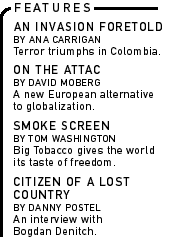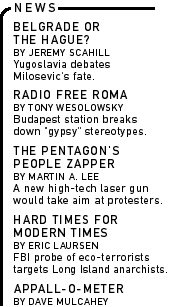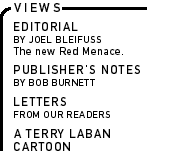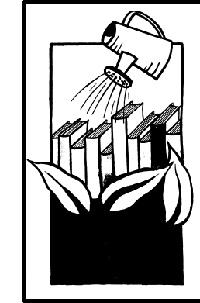

|

|

|

|
| |
|
|||
|
The Cash Nexus: Money and Power In Lucky Jim, Kingsley Amis' satire of life in a university town in postwar Britain, the protagonist--a young historian stranded in the provinces--is asked the title of a journal article he has written, still unpublished after several attempts. The scholar can barely stand to answer the question. "It was," he thinks, "a perfect title, in that it crystallized the article's niggling mindlessness, its funereal parade of yawn-enforcing facts, the pseudo-light it threw upon non-problems." Finally, he coughs it out: "The Economic Influence of the Development of Shipbuilding Techniques, 1450 to 1485. After all, that's what it's ..." His voice trails off. Had Niall Ferguson written such a paper, he would have stated the dry-as-dust title without pause. In fact, he probably would have managed to turn it into a raging controversy. Ferguson, a prolific Oxford don who's just a shade too grown-up to still be deemed precocious, writes on such topics as bond yields and taxation, exchange rates and war finance. Yet despite--or perhaps because of--his work on the arcana of budgets and banks, Ferguson cultivates an image as a contrarian, dating back to his days as a Thatcherite "punk Tory" at Oxford, when he and best friend Andrew Sullivan would listen to the Sex Pistols and make fun of stodgy left-Labourites. Two years ago, Ferguson made a splash with his The Pity of War, which argued that Britain should have stayed out of World War I. This would have prevented the rise of Hitler and the Russian Revolution, and it would have enabled the country to hold onto its empire throughout the 20th century. The war, he wrote, was "the greatest error of modern history." The Pity of War made headlines all over a subdued Britain. The book was a perfect
But Ferguson is more than an intellectual provocateur and celebrity don (who, according to one New Yorker profile, makes classrooms of undergrads swoon with his natty wardrobe and Tom Cruise good looks). His real target, throughout his work, is the last great generation of British Marxist historians: Eric Hobsbawm, E.P. Thompson, Christopher Hill. "At once materialist in conception and romantic at heart, an entire library of history has been based on the assumption that there was something fundamentally amiss with the capitalist economy," he writes. His life's work is to create a self-consciously non-Marxist economic history, rigorously focused on finance as opposed to production or class--and focused only on finance, instead of trying to link the economy to culture, politics or intellectual life. His latest book, The Cash Nexus, a series of essays on financial history, is his most ambitious effort to write this kind of economic history yet. Ferguson differs from the Marxists in method as well as subject. He criticizes narrative as overly "deterministic," yet says that he is seeking a more "scientific" history. A devotee of chaos theory, he likens history to "a chaotic process, in the scientists' sense of 'stochastic behavior in a deterministic system.' " The job of the historian is to capture the perspective of the powerful individuals who made decisions about wars, battles, the economy, who did not know what the outcome of their choices might be. History turns on a hairpin; people act under short-term considerations--the falling price of a government bond, the next election or the last state budget--not the long-term abstractions of industrialization, urbanization, capitalist development. But despite Ferguson's appealing penchant for contention, this is a history that quickly loses its way. While he rejects determinism, in his focus on the most abstruse and technical aspects of economic institutions he rejects human agency as well. Absent the drama of the conscious struggle to shape the world, history--and the vocation of the historian--loses its meaning and moral significance. As one might expect from a Ferguson book, The Cash Nexus takes an embattled tone from the beginning. He claims to be seeking simultaneously to disprove the sunny platitudes of Thomas Friedman, who suggests that free markets invariably encourage democracy, and the cataclysmic predictions of the Marxists, who see economic contradictions inexorably grinding society into dust. Against these forms of "economic determinism," Ferguson asserts that the economy is subordinate to the state and to politics: "Money does not make the world go round. ... Rather, it has been political events--above all, wars--that have shaped the institutions of modern economic life: tax-collecting bureaucracies, central banks, bond markets, stock exchanges." But from the preface on, Ferguson is at odds with himself. Though he wants to
Even when writing about imperialism--the ultimate ascendancy of the state over the economy, the quest for ever-expanding political power--Ferguson is quick to restrict his analysis to finance. Imperialism, he explains, is inexpensive; economic constraints should not hold the United States back from intervening in conflicts around the world. This is why he finds American reluctance to deploy troops disappointing: "The leaders of the one state with the economic resources to make the world a better place lack the guts to do it." What is strange about Ferguson's reduction of political questions to matters of finance is that finance itself is quintessentially political; it has to do with ownership, control, power and social obligation. War does revolutionize finance, and social democracy is, among other things, a way of organizing a tax system. But the difficulties of raising money for war, to take the military case, are more than an "inter-temporal budget constraint," as Ferguson puts it. The tax code is the backbone of society, revealing the underlying bonds that link people to one another, the obligations different groups within society are expected to bear to the whole. Far from being technical documents, state budgets reflect ideas about society that justify one distribution of wealth and power over another. This is why financial crises can precipitate vast social transformations. The French Revolution, after all, began as a fiscal crisis; the Third Estate was convened to collect taxes. The American Revolution, as well, started out when the Crown had bills to be paid. Behind the austere columns of state budgets hide relationships of power and domination and ideas about justice. But instead of following the money, Ferguson just wants to count it. Given his single-minded focus on the financial aspects of modern history, one wonders why Ferguson even bothers to argue for the primacy of politics. One possibility is that he's nostalgic for the days when Britannia ruled the waves. Another is that he's seeking to carve out a space for financial history against the predictive models of the economists. Or maybe he wants to prove that even politics can be best understood through detailed analysis of complicated financial instruments. At times, a note of economistic machismo creeps into Ferguson's work. Other historians just tell stories, but he sees himself as a tough-minded analyst working with tricky numbers. The Cash Nexus is not a narrative, but a series of analytical chapters on questions such as "What causes stock market bubbles?" and "How far can exchange rate systems or monetary unions increase financial stability?" The idea here is that history, as he told one interviewer, standing in front of a blackboard covered with mathematics in his office in the Bank of London, must be "difficult to be good." In the pages of tables calculating bond yields and GDP, however, the scope of human action and political struggle--the effort of people with different ideas about society to shape the world--gets lost. Ferguson's history may not exactly be deterministic, but its strict focus on financial institutions does not leave much room for human agency either. The great strength of the Marxist historians was to see that all aspects of society--ideas, culture, finance--could be the terrain of political conflict. They sought, in particular, to argue that the economy--so often seen as a realm of neutral laws and atomistic actors--was a political space, subject, like everything else, to the will of human beings, and therefore a potential realm of freedom. By contrast, Ferguson seeks to reduce politics to the evolution of financial instruments and tax-collecting techniques. This elides the political and ideological aspects of finance, and it also reduces the great questions of modern history to tables of bond prices and the unthinking decisions of individual investors. So while Ferguson may see himself as a ruthless debunker of Marxian romanticism, he's more reminiscent of the British intellectuals Nietzsche once denounced: "You always find them at the same task, whether they want to or not, looking for what is really effective and distinctive about our development where man's intellectual pride would least wish to find it ... in [things that are] purely passive, automatic, reflexive, molecular." Despite his cleverness, ambition and zeal, in forsaking politics
for bonds and interest rates Ferguson reveals himself to be flailing
as a historian, trapped within The Cash Nexus. Kim Phillips-Fein is an In These Times contributing editor. She can be reached at kkp4@columbia.edu.
|



